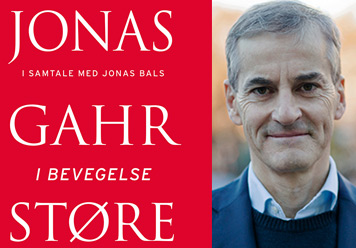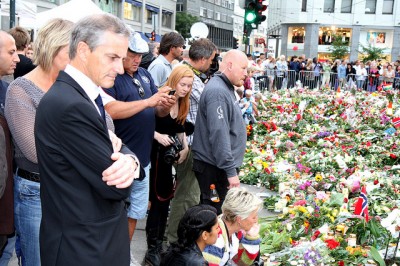New Labour Party leader Jonas Gahr Støre released a new book on Tuesday in which he puts much of the blame for Labour’s loss of government power last year on the July 22 attacks carried out by a lone bomber and gunman in 2011. Instead of winning and retaining a sympathy vote, Støre thinks voters wanted to put July 22 behind them when national elections rolled around last fall.

Støre’s book, written with co-author Jonas Bals of the trade union federation Fellesforbundet, is being described as a political program declaration for Labour’s new leader, who replaced Jens Stoltenberg in June. Støre told reporters at a book launch on Tuesday that he started working on the book in earnest last fall, after Labour lost its bid for a third term of leading a left-center government coalition with the Socialist Left (SV) and the Center Party (Sp).
Labour (Arbeiderpartiet) actually retained its spot as having the most support of any single political party in Norway. It claimed 30.8 percent of the vote compared to the 26.8 percent won by the Conservative Party (Høyre), which went on to form a new coalition government with the more conservative Progress Party (Fremskrittspartiet). Labour’s two partners, however, lost badly in last fall’s election, thus failing to give the left-center coalition the majority it needed to stay in power.
Most political commentators have said voters simply were ready for a change after eight years of the left-center government. Norwegian Broadcasting (NRK) reported Tuesday that Støre sees many reasons for Labour’s loss, but he dwelled on the July 22 attacks by a right-wing extremist who proclaimed that he wanted to wipe out the next generation of Labour politicians. The extremist killed 77 people including 69 at a Labour Party summer camp.
“One of the reasons for the shift in the majority in 2013, I think, was that voters wanted to put July 22 behind them, along with all the discussion on responsibility and preparedness and weaknesses,” Støre said. “Jens Stoltenberg and the Labour Party had both support and the confidence of many, but others were affected.”

Støre thinks the entire latter half of the Labour-led government’s second term was affected by the July 22 Commission’s report, which highlighted a lack of crisis preparedness, and by debate on who was to blame, while grieving Labour politicians themselves were drained of energy. Støre went so far as to draw a parallel to Winston Churchill’s loss after World War II. Churchill led the country through the war and won it, but lost his bid for re-election, too. Støre thinks voters want to move away from violence and evil and into the future.
He claimed that many of his colleagues also underestimated the long-term political effects of the attacks and he agrees with the Labour Party secretary, Raymond Johansen, who said in June that it was time to talk about why the party and its government were attacked on July 22, 2011. “When the door was locked behind the perpetrator at Ila Prison after he was convicted in August 2012, it’s as if we also locked the door on the most sensitive question about what led to his attacks,” said Støre, who consistently refuses to call the attacker, Anders Behring Breivik, by name.
“I’m still bothered by that,” Støre told NRK P2 during the radio program Politisk kvarter Tuesday morning. “Community debate hasn’t grappled with all that it should.” Støre believes Norwegians must talk more about what motivated the ultra-right-wing terrorist. “We’ve seen on the Internet that he wasn’t alone in the attitudes he expresses in his manifesto,” he said. “There’s no clear answer as to what we should do about them, but we haven’t dared to take the debate.”
He views Monday’s landmark demonstration in Oslo against extremism as “a healthy sign” and believes all forms of extremism must be tackled. “We need to understand where it’s coming from,” Støre said.
In other political areas, Støre indicated a need to take Labour back to its labour roots, admitting there are “too many” academics and professionals represented in politics instead of those “who can lay pipes and build buildings or work in hospitals.” He wants to raise the status of “ordinary working people,” and get them more involved in politics.
He continued to be relatively vague about his position on climate issues, which recently caused a stir when he suggested that “we need to listen” to those who say much of the world’s (and Norway’s) oil and gas should be left undergound. He later backtracked after howls of protest from labour organizations, adding that gas production in Norway can help offset the use of coal elsewhere.” The Labour Party has long supported Norway’s oil industry because of the jobs it generates, while also trying to portray itself as environmentally conscious, a tricky balance to maintain.
Støre’s book is one of three coming out this fall about him, and he wrote another book when he was still Norway’s foreign minister. Publisher Cappelen Damm is unabashedly promoting Støre’s new book as “the most important political book” of those being released this fall. The two other books are biographies due later in the autumn.
newsinenglish.no/Nina Berglund

